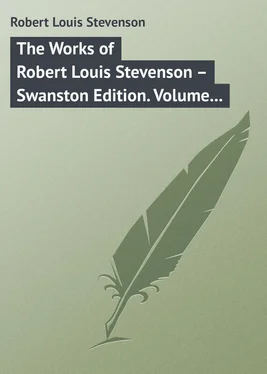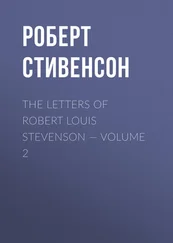Robert Stevenson - The Works of Robert Louis Stevenson – Swanston Edition. Volume 23
Здесь есть возможность читать онлайн «Robert Stevenson - The Works of Robert Louis Stevenson – Swanston Edition. Volume 23» — ознакомительный отрывок электронной книги совершенно бесплатно, а после прочтения отрывка купить полную версию. В некоторых случаях можно слушать аудио, скачать через торрент в формате fb2 и присутствует краткое содержание. ISBN: , Жанр: foreign_prose, на английском языке. Описание произведения, (предисловие) а так же отзывы посетителей доступны на портале библиотеки ЛибКат.
- Название:The Works of Robert Louis Stevenson – Swanston Edition. Volume 23
- Автор:
- Жанр:
- Год:неизвестен
- ISBN:http://www.gutenberg.org/ebooks/30894
- Рейтинг книги:3 / 5. Голосов: 1
-
Избранное:Добавить в избранное
- Отзывы:
-
Ваша оценка:
- 60
- 1
- 2
- 3
- 4
- 5
The Works of Robert Louis Stevenson – Swanston Edition. Volume 23: краткое содержание, описание и аннотация
Предлагаем к чтению аннотацию, описание, краткое содержание или предисловие (зависит от того, что написал сам автор книги «The Works of Robert Louis Stevenson – Swanston Edition. Volume 23»). Если вы не нашли необходимую информацию о книге — напишите в комментариях, мы постараемся отыскать её.
The Works of Robert Louis Stevenson – Swanston Edition. Volume 23 — читать онлайн ознакомительный отрывок
Ниже представлен текст книги, разбитый по страницам. Система сохранения места последней прочитанной страницы, позволяет с удобством читать онлайн бесплатно книгу «The Works of Robert Louis Stevenson – Swanston Edition. Volume 23», без необходимости каждый раз заново искать на чём Вы остановились. Поставьте закладку, и сможете в любой момент перейти на страницу, на которой закончили чтение.
Интервал:
Закладка:
Once more, it is said that in every poet there must be something of the woman. If to be quick in sympathy and feeling, ardent in attachment, and full of pity for the weak and suffering, is to be womanly, Stevenson was certainly all those; he was even like a woman in being ἀρτίδακρυς, easily moved to tears at the touch of pity or affection, or even at any specially poignant impression of art or beauty. But yet, if any one word were to be chosen for the predominant quality of his character and example, I suppose that word would be manly. In his gentle and complying nature there were strains of iron tenacity and will: occasionally even, let it be admitted, of perversity and Scottish “thrawnness.” He had both kinds of physical courage – the active, delighting in danger, and the passive, unshaken in endurance. In the moral courage of facing situations and consequences, of readiness to pay for faults committed, of outspokenness, admitting no ambiguous relations and clearing away the clouds from human intercourse, I have not known his equal. The great Sir Walter himself, as this book will prove, was not more manfully free from artistic jealousy or irritability under criticism, or more unfeignedly inclined to exaggerate the qualities of other people’s work and to underrate those of his own. Of the humorous and engaging parts of vanity and egoism, which led him to make infinite talk and fun about himself, and use his own experiences as a key for unlocking the confidences of others, Stevenson had plenty; but of the morose and fretful parts never a shade. “A little Irish girl,” he wrote once during a painful crisis of his life, “is now reading my book aloud to her sister at my elbow; they chuckle, and I feel flattered. – Yours, R. L. S. P.S. – Now they yawn, and I am indifferent. Such a wisely conceived thing is vanity.” If only vanity so conceived were commoner! And whatever might be the abstract and philosophical value of that somewhat grimly stoical conception of the universe, of conduct and duty, at which in mature years he had arrived, want of manliness is certainly not its fault. Take the kind of maxims which he was accustomed to forge for his own guidance: – “Acts may be forgiven; not even God can forgive the hanger-back.” “Choose the best, if you can; or choose the worst; that which hangs in the wind dangles from a gibbet.” “’Shall I?’ said Feeble-mind; and the echo said, ‘Fie!’” “’Do I love?’ said Loveless; and the echo laughed.” “A fault known is a fault cured to the strong; but to the weak it is a fetter riveted.” “The mean man doubts, the great-hearted is deceived.” “Great-heart was deceived. ‘Very well,’ said Great-heart.” “’I have not forgotten my umbrella,’ said the careful man; but the lightning struck him.” “Shame had a fine bed, but where was slumber? Once he was in jail he slept.” With this moralist maxims meant actions; and where shall we easily find a much manlier spirit of wisdom than this?
There was yet another and very different side to Stevenson which struck others more than it struck myself, namely, that of the freakish or elvish, irresponsible madcap or jester which sometimes appeared in him. It is true that his demoniac quickness of wit and intelligence suggested occasionally a “spirit of air and fire” rather than one of earth; that he was abundantly given to all kinds of quirk and laughter; and that there was no jest (saving the unkind) he would not make and relish. The late Mr. J. A. Symonds always called him Sprite; qualifying the name, however, by the epithets “most fantastic, but most human.” To me the essential humanity was always the thing most apparent. In a fire well nourished of seasoned ship-timber, the flames glance fantastically and of many colours, but the glow at heart is ever deep and strong; it was at such a glow that the friends of Stevenson were accustomed to warm their hands, while they admired and were entertained by the shifting lights.
It was only in company, as I have said, that all these many lights and colours could be seen in full play. He would begin no matter how – perhaps with a jest at some absurd adventure of his own, perhaps with the recitation, in his vibrating voice and full Scotch accent, of some snatch of poetry that was haunting him, perhaps with a rhapsody of analytic delight over some minute accident of beauty or expressiveness that had struck him in man, woman, child, or external nature. And forthwith the floodgates would be opened, and the talk would stream on in endless, never importunate, flood and variety. A hundred fictitious characters would be invented and launched on their imaginary careers; a hundred ingenious problems of conduct and cases of honour would be set and solved; romantic voyages would be planned and followed out in vision, with a thousand incidents; the possibilities of life and art would be illuminated with search-lights of bewildering range and penetration, sober argument and high poetic eloquence alternating with coruscations of insanely apposite slang – the earthiest jape anon shooting up into the empyrean and changing into the most ethereal fantasy – the stalest and most vulgarised forms of speech gaining brilliancy and illuminating power from some hitherto undreamt-of application – and all the while an atmosphere of goodwill diffusing itself from the speaker, a glow of eager benignity and affectionate laughter emanating from his presence, till every one about him seemed to catch something of his own gift and inspiration. This sympathetic power of inspiring others was the special and distinguishing note of Stevenson’s conversation. He would keep a houseful or a single companion entertained all day, and day after day and half the nights, yet never seemed to monopolise the talk or absorb it; rather he helped every one about him to discover and to exercise unexpected powers of their own.
Imagine all this helped by the most speaking of presences: a steady, penetrating fire in the brown, wide-set eyes, a compelling power and richness in the smile; courteous, waving gestures of the arms and long, nervous hands, a lit cigarette generally held between the fingers; continual rapid shiftings and pacings to and fro as he conversed: rapid, but not flurried nor awkward, for there was a grace in his attenuated but well-carried figure, and his movements were light, deft, and full of spring. There was something for strangers, and even for friends, to get over in the queer garments which in youth it was his whim to wear – the badge, as they always seemed to me, partly of a genuine carelessness, certainly of a genuine lack of cash (the little he had was always absolutely at the disposal of his friends), partly of a deliberate detachment from any particular social class or caste, partly of his love of pickles and adventures, which he thought befel a man thus attired more readily than another. But this slender, slovenly, nondescript apparition, long-visaged and long-haired, had only to speak in order to be recognised in the first minute for a witty and charming gentleman, and within the first five for a master spirit and man of genius. There were, indeed, certain stolidly conventional and superciliously official kinds of persons, both at home and abroad, who were incapable of looking beyond the clothes, and eyed him always with frozen suspicion. This attitude used sometimes in youth to drive him into fits of flaming anger, which put him helplessly at a disadvantage unless, or until, he could call the sense of humour to his help. Apart from these his human charm was the same for all kinds of people, without distinction of class or caste; for worldly-wise old great ladies, whom he reminded of famous poets in their youth; for his brother artists and men of letters, perhaps, above all; for the ordinary clubman; for his physicians, who could never do enough for him; for domestic servants, who adored him; for the English policeman even, on whom he often tried, quite in vain, to pass himself as one of the criminal classes; for the shepherd, the street arab, or the tramp, the common seaman, the beach-comber, or the Polynesian high-chief. Even in the imposed silence and restraint of extreme sickness the power and attraction of the man made themselves felt, and there seemed to be more vitality and fire of the spirit in him as he lay exhausted and speechless in bed than in an ordinary roomful of people in health.
Читать дальшеИнтервал:
Закладка:
Похожие книги на «The Works of Robert Louis Stevenson – Swanston Edition. Volume 23»
Представляем Вашему вниманию похожие книги на «The Works of Robert Louis Stevenson – Swanston Edition. Volume 23» списком для выбора. Мы отобрали схожую по названию и смыслу литературу в надежде предоставить читателям больше вариантов отыскать новые, интересные, ещё непрочитанные произведения.
Обсуждение, отзывы о книге «The Works of Robert Louis Stevenson – Swanston Edition. Volume 23» и просто собственные мнения читателей. Оставьте ваши комментарии, напишите, что Вы думаете о произведении, его смысле или главных героях. Укажите что конкретно понравилось, а что нет, и почему Вы так считаете.










